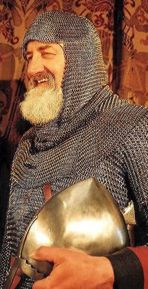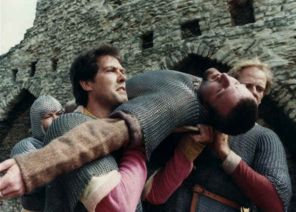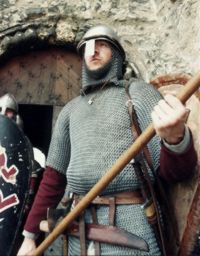The Old Warrior
The old warrior looked across the valley. It had been a hard fight but it was over now. Every year they were being pushed further north. Six years ago he had stood proudly by Harold's side, wounded but happy, for a great victory had been achieved: Hardrada walked the earth no more and the tattered remains of his army fled back across the sea. Since then he seemed to have been forever fighting the Norman invaders. First at Senlac, where he stood before his king, holding the shieldwall tight until a Norman sword ended the battle for him. He traced the line of the scar from his forehead to mouth and shuddered as he thought how close he had come to losing his eye, how close to losing his life. Since then, death seemed constantly at his shoulder, waiting, but not coming for him yet.

He thought of how as he had travelled north, ahead of the invaders Saxon and Dane united against the common foe. But always too late, there was no organisation, the armies were always too small, too badly equipped, they never stood a chance against the disciplined might of the Normans' forces. Still, he had always fought, always given good account of himself. It seemed the knights had not yet fully learned the lesson of the broadaxe. This thought made him smile.
He remembered the fighting four years ago, along side Harold's sons near Brycgstow, then Stafford three years ago. York, site of that great victory a few years earlier, in flames by a Norman's hand. And so it went, pushed, fighting, ever further north.
Now he came back to the present and once more he looked around the battlefield. Their spirit was strong, but most of them were not warriors. For 15 years he had served Harold, but these men, most of them were no more than farmers. He picked up his broken axe and looked around for those wounded that could be saved. He came across young Orri, no more than twelve summers old, his spear no more than a kitchen knife lashed to a young sapling. He was covered in blood, not all of it his own, but he was smiling despite his wounds. Others were not so lucky. They had had the victory, but it had cost them dear, many good men would not be returning to the mead benc27 March, 2005an's camp.
Once the dead were stripped of their arms and buried a weary bunch of men headed north, back into the fells, back to their lord's hall, the wounded and the trophies carried on the dead Normans' horses.
Some hours after dark the warriors reached the hall. Women came out to greet them, looking for their loved ones, praying that they were not amongst the fallen, the sound of crying growing ever louder at the news of lost kin. The old warrior entered the hall, strode to the high seat and stood before the Jarl.
'So Ælfric, you saw some fighting? Went it well? Will many grieve for their loved ones? Come, tell me of the battle.'
The old warrior looked into the Jarl's eyes 'We found their camp three days ago, my lord. Ever they push further north, this camp was but a day's march from here, I fear soon needs must that we move deeper into the hills, beyond the Winding Mere, but for now we need not fear them. Our archers stung them as the sat in their camp. Then as we planned they followed us into the valleys. It seems they have still not learned the lesson taught to us in Wales, for their horsemen followed us into the trap. The fighting was hard and we lost near a score of good men, but they lost more. We counted three score plus seven dead Normans before we withdrew. The survivors returned to their camp, several of them sorely wounded. We watched their camp, and they sent a rider southwards, but whatever message he was carrying did not get through, Einar saw to that.'
'What of those left in the camp?' asked the Jarl.

'They waited a day then sent out a patrol. It did not return. Then they broke camp, started heading south again, and we pressed them hard. Many a Norman now lies as food for wolves and ravens. But then a few of their Knights, four score in number, left the main train and headed back to find us, we were too few to face them in open battle, so we lured them back into the hills, until earlier this day we ambushed them in Snorri's dale. We lost twelve men, and a score plus one more were wounded, but none of the Invaders returned to their people.'
'You have done well good Ælfric, it is in my mind that I should reward you, as was done in the old days, but now we have no stores of silver, no golden rings for a trusty retainer. But nonetheless, your sword band shall feast well tonight and we shall sing songs to see the dead into Valhalla.'
'Or the heavenly kingdom, my Lord.'
'Aye, brave Ælfric, or the heavenly kingdom.' replied the Jarl.
Soon the hall was all bustle and activity as men put out the tables and women prepared the food. That night there was much feasting, many a mead-horn was passed around the throng and many a song was sung for the fallen warriors. Laughter, tinged with sadness echoed around the old hall. The poet told tales of ancient heroes and mighty deeds, and then, as he heard more of what had passed, he composed a lay, in the correct metre, for those that had battled that day.

As the days passed from spring into summer news reached the hall that the main forces of the Norman invaders were pressing ever northwards, and in fact there were Norman castles as far north as the Mersey. Many an old landowner was being stripped of his lands, those that resisted being put to the sword. It seemed the Normans knew only fire and battle. The Jarl sent messages to his cousin on Man, asking for help, and other messages to his kin in the Western Isles. A few came, but by far the most common arrival was the dispossessed farmer or land owner, driven out by their new Norman masters. Many refused the yoke of a Norman master and fled north, where they had heard that a man could still live free from the Norman rule. Soon, around the Jarl's hall was a small village of wood and canvas as men arrived to swell the Jarls forces, Saxon and Viking, Christian and Pagan, all united by a common hatred for their new masters. All through the summer the sound of hammer on anvil was heard as smiths produced arms to equip the ever growing army. All through the summer the sound of weapon on shield echoed through the vale as warriors honed their fighting skills.
Then, as the harvest time drew near the news that all had been expecting arrived. Runners from the southern slopes came to the hall with news that a large Norman army was heading north towards the hall. Soon everything was movement, men ran to fetch their shields and spears, the older and more experienced warriors donned helmets and mailshirts.
By nightfall the army moved out, down towards the shores of the Winding Mere, near its head strode Ælfric, bright in his armour, his sword, given him by Eorl Harold himself, at his side, his broadaxe on his shoulder and next to him Orri, in a shining new helm, a proper spear on his shoulder and shield on his back.
At midnight men looked out from the wooded slopes at the edge of the lake onto the Norman watch fires. No small raiding party this time, but an army come to claim the land in the Name of William. The old warrior surveyed the camp and thought to himself 'now comes the storm, this battle will decide whether any corner of this proud land will remain free of Norman tyranny. I27 March, 2005e Englishmen may never walk free again.' Turning on his heel he returned to his sword band, to organise them for what he knew would be his final battle, for now death was closer by his shoulder than ever before....
Ben Levick, 1992